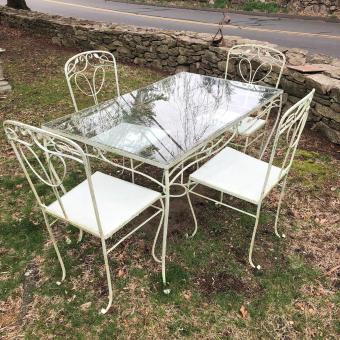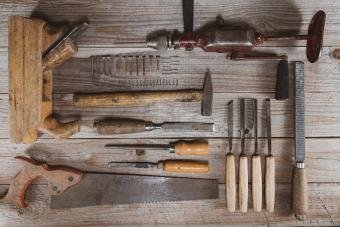
When you're shopping for antique patio sets and other lovely pieces, it helps to know how to identify vintage wrought iron furniture. Wrought iron was a popular material during the early part of the 20th century, and it remains a hot item with collectors who love its vintage style and sturdy quality.
How to Tell if Furniture Is Wrought Iron
Once you know what to look for, identifying wrought iron isn't that difficult. These are some characteristics of wrought iron you can see in everything from vintage lawn furniture to antique metal bed frames.
Vintage Wrought Iron Furniture Is Valuable
If you're looking at a piece at a flea market, antique store, or estate sale, the first clue is on the price tag. According to Country Living, a simple, unmarked patio side chair made of wrought iron can sell for at least $100. If it's a full dining set or a piece by a coveted manufacturer, the price tag can easily top $1,000. For example, a Salterini wrought iron curved sofa sold on eBay for just under $2,000 in mid-2020. Cheaper prices can indicate cast iron, steel, or aluminum.
Wrought Iron Doesn't Have Mold Lines
Wrought iron furniture is not the same as cast iron furniture, and the first step to identifying wrought iron is learning to tell the difference between the two. Vintage cast iron furniture was made by pouring molten iron into a mold and allowing it to harden. When the piece is cool, the manufacturer would open the mold to remove it, and the end piece usually has telltale mold lines that speak to its cast nature. This is not so for wrought iron furniture. It is made of iron, but it was "wrought" by a blacksmith and was never in a mold.

Vintage Wrought Iron Furniture Is Heavy
Wrought iron is not a lightweight material. If you struggle to move a metal chair, it may be wrought iron. In the 1960s, wrought iron went out of style partly because it was so heavy. It was replaced by lighter steel and aluminum pieces.
If It Has Rust, It May Be Wrought Iron
Wrought iron is prone to rusting, especially if it sits outside and is not regularly protected with paint or varnish. If you find a piece of furniture with rust, it could be vintage cast iron or wrought iron.

Wrought Iron Passes the Magnet Test
If you're wondering if a piece is aluminum or wrought iron, try putting a magnet against it. If the magnet is attracted to the metal, it could be wrought iron. If not, it's probably aluminum.
Wrought Iron Furniture May Have a Textured Surface
Wrought iron was "wrought" by a blacksmith, and it often has hammer marks or other signs of work in the surface of the metal. If the surface is rough but uniform, it may be cast iron or steel instead.
Vintage Wrought Iron May Not Be Marked
Many wrought iron pieces were handmade by blacksmiths and may not bear a maker's mark or other identifying information. In fact, many noted designers and manufacturers did not mark their pieces either. Still, if you can find a mark, it will help you identify the piece. Start by looking the piece over, paying special attention to the underside, back, and legs. Look for tags, stamped or engraved symbols, or even stickers. If you find one, look it up online.

Vintage Wrought Iron Furniture Manufacturers
There are several noted designers of vintage wrought iron furniture, and many of these are worth more than pieces by individual artisans. Because pieces are often unmarked, looking at pattern books can help. Antique wrought iron restoration company Iron Renaissance has catalogs of the patterns used by many of the most coveted manufacturers.
- Salterini - Made in Brooklyn between 1928 and 1953, Salterini furniture includes dining sets, high-backed lounge chairs, and more.
- Leinfelder - This 1930s-era Wisconsin brand often featured bright paint colors, such as pink, yellow, and green.
- Lee Woodward and Sons - This noted Michigan manufacturer made wrought iron furniture in the 1930s, often using unique patterns.
- Florentine Craft Studio - From 1910 through the 1930s, this company made patio sets, sculptures, and more in their New York workshop.
Beautiful Art Deco Furniture
If you love the artisan quality of vintage wrought iron furniture but want to explore other materials, there are lots of unique handmade Art Deco furniture pieces from the same era. Once you know how to identify antique furniture, you can find a great piece in any material or time period.







